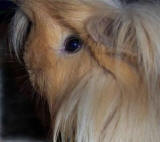|
Need Help?
|
|
Call
1-800-372-3706
to
speak to a Veterinary Behavior Technician |
|
Paws To Speak!
Member
Main Menu
|
 |
|
Help is at your
fingertips by library, email and
phone. |


|
Let's go over a few of the sounds you will hear over the life of your Pet. Most Pet Parents find the sounds of their guinea pigs endearing and over time, as you and your new Pet become acquainted, you will also find the sounds to be a joyful addition to your life. 
Vocalizations
-
Purring You will notice two
distinct types of purrs come
from your little guinea pig. The first
purr is a higher pitched purr
which is accompanied by a stiff
body. This purr indicates your
guinea pig is frightened or
scared. A lower pitched purred
accompanied by a fully relaxed
body typically indicates a
comfortable happy Pet.
-
High-Pitched Squealing Your
guinea pig knows exactly what he
or she wants as well as when he
or she wants it. Make no
mistake, a high pitched squeal
typically is telling you that
your Pet wants you to know
something. Whether it is a
simple "Hi!" or a "Give me a
snack!" your guinea pig is
telling you something. Over
time, you will learn exactly
what each little squeal means.
-
Shrieks Just like an alarm,
shrieks indicate something is
wrong. Your Pet may be
frightened, scared, alarmed, or
in pain. Anytime you hear
obvious shrieks, it would be a
good idea to take a quick peek
to make sure everything is
alright.
-
Teeth
chattering The guinea pig with
chattering teeth is typically an
unhappy guinea pig. This is a
warning. Your best bet is to
take a step back and stop what
you are doing.
-
Whining Your guinea pig is telling you he or she is annoyed by something you or another guinea pig is doing.
-
Rumbling A low pitched noise you may hear during mating season. It will be lower than a purr and sometimes a dance will accompany the rumble.
Take time to listen and interpret each sound your guinea pig makes. You will quickly begin to notice patterns which will help you understand what your guinea pig is telling you!
What to do
- Do NOT try to stop squealing by
giving a toy, food, treat, or your attention. Get the
guinea pig to be quiet FIRST and then reward the quiet behavior.
- Do NOT touch
the guinea pig during excessive
vocalization.
- Do NOT let the guinea pig out of the pen in direct response to vocalization.
- DO provide
distractions before the squealing
begins.
- DO make sure your Pet is quiet - for
2 to 5 seconds before
getting any rewards.
-
As
time goes on, expect more seconds, then minutes of
quiet before giving a reward. DO
praise quiet.
-
Watch for accidental rewards - wins -
the guinea pig gets for excessive squealing. Make it MORE rewarding NOT to
vocalize excessively.
Why do they make noise
to get our attention?
Guinea pigs are cute and adorable but they can be incessant when it comes to their vocalizations. One of the most misguided uses of their squeal is to beg for food. Do not encourage this behavior by offering them food while they are squealing. You will inadvertently teach them to use those vocalizations to get what they want.
When we accidentally reward
unwanted behaviors such
as excessive
vocalization by providing
food, attention,
or play
in an attempt to stop
the racket, these
rewards may increase
future outbursts. Just like the jackpots
in Las Vegas,
intermittent rewards
create persistent
behaviors.
|